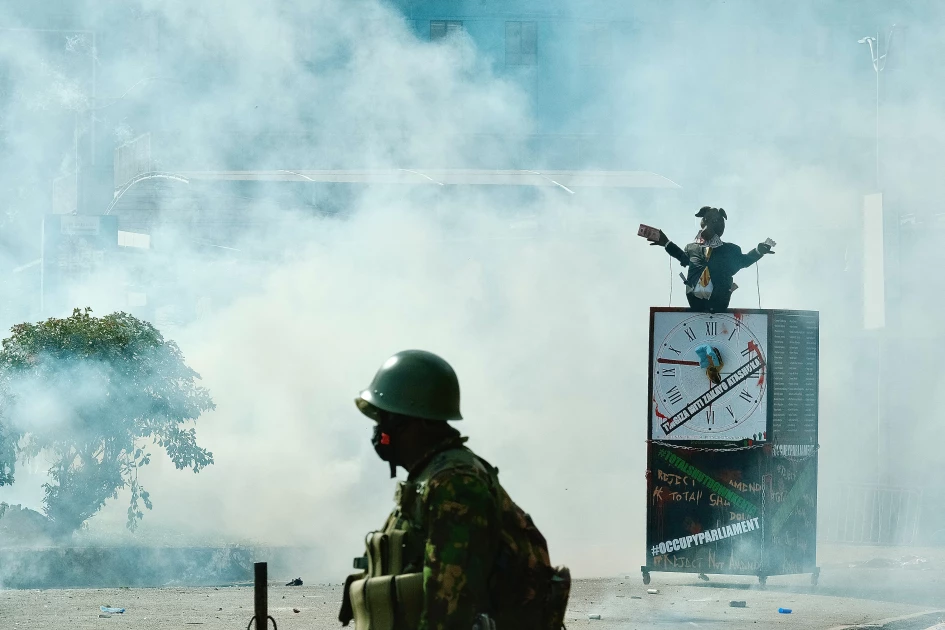Anti-Finance Bill protests: What is treason?

A Kenya Police officer is enveloped by a cloud of tear gas after demonstrators stormed the Kenyan Parliament during a nationwide strike against tax hikes and the Finance Bill 2024 in downtown Nairobi, on June 25, 2024. (Photo by KABIR DHANJI / AFP)

Audio By Vocalize
After Tuesday’s day-long nationwide protests
against the unpopular Finance Bill 2024 that culminated in crowds breaking
through police lines and breaching Parliament buildings in Nairobi, President
William Ruto late in the evening denounced the day’s events as treasonous.
In the demonstrations at the capital, angry
crowds broke through the Parliament barricades past the heavy police presence
around 3 p.m. after legislators passed the bill, which now awaits presidential
assent to become law.
The ceremonial mace, which symbolizes the authority of the legislature, was stolen, some parts of the parliament building vandalised and a section of it set on fire.
Police fired live ammunition at the mob, killing at least five people and injuring over 30 others, according to Amnesty International.
Moments later, the nearby City Hall, which houses the Nairobi Governor’s office, was also set on fire.
President Ruto in a televised late evening address
from State House Nairobi said “organised criminals” hijacked a “critical
conversation” on the proposed law -- which seeks to hike taxes -- and caused havoc.
Terming the events a threat to national
security, the president vowed to crack down on the “planners, financiers, orchestrators
and abetters of violence and anarchy” and deployed the military to back the
police force’s security enforcement.
Over 125 people were injured in the day’s
events, the human rights organisation HAKI Africa said.
Treason is a major offence against the State. It is defined as conduct which comprises a breach of allegiance owed to
the State.
The crime falls under offences against
public order as defined in Section 40 of the Penal Code.
Per the law, the State has a duty to
protect its citizens and those who reside in it. Similarly, the citizens and the
residents owe allegiance to the State and when this allegiance is broken, it is
termed as treason against the State.
The Penal Code spells out that treason can
occur when a person who owes allegiance to the republic, in Kenya or elsewhere,
compasses, imagines, invents, devises or intends the death, maiming or
wounding, or the imprisonment or restraint, of the president.
It is also treasonous to depose, by
unlawful means, the president from his position or from the style, honour Head
of State and Commander-in-Chief of the Armed Forces of the Republic of Kenya.
It also includes overthrowing, by unlawful
means, the Kenyan government.
The law states that anyone who expresses,
utters or declares any such compassings, imaginations, inventions, devices or
intentions by publishing or writing or by any overt act or deed, is guilty of
the offence of treason.
“Any person who, owing allegiance to the
Republic levies war in Kenya against the Republic; or is adherent to the
enemies of the Republic, or gives them aid or comfort, in Kenya or elsewhere;
or instigates whether in Kenya or elsewhere any person to invade Kenya with an
armed force, is guilty of the offence of treason,” the Constitution states.
Any person guilty of the offence of treason shall be sentenced to death, says the law.


Leave a Comment